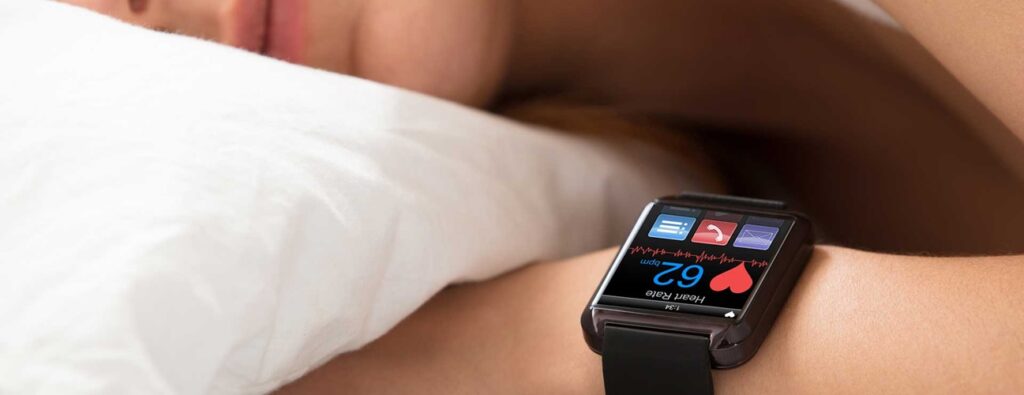Struggling to sleep night after night? Sleep trackers for insomnia might be the missing piece in your bedtime puzzle. How can a small wearable or under-mattress device help you conquer those long, restless nights?
Sleep trackers for insomnia analyze your sleep patterns—tracking stages, movements, heart rate, and disturbances. Devices like the Oura Ring, Fitbit Sense, and Withings Sleep use smart sensors to pinpoint problems and offer data-backed solutions. They give insights into what might be sabotaging your sleep and help you build better habits based on real metrics.
But there’s more to these tools than just numbers and graphs. Experts like Dr. Michael Breus, known as “The Sleep Doctor,” endorse smart tracking as a game changer for insomnia treatment. So let’s dive into the world of sleep tech and discover which tracker can finally help you rest easy.
Introduction to Sleep Trackers for Insomnia
Struggling with insomnia can be tough. Sleep trackers for Insomnia can help you understand your sleep patterns. They offer insights into how well you sleep. This can help improve your sleep quality.
What Sleep Trackers Are and Why They Matter for Insomnia
Sleep trackers are devices that monitor your sleep. They can be worn on your wrist or placed under your mattress. Some are even apps on your phone. They collect data about your sleep habits. This data can help you understand your sleep better.
How Sleep Trackers Work to Monitor Restless Nights
Sleep trackers use sensors to monitor your body movements. Some use heart rate monitors too. These sensors track how long you sleep and the quality of your sleep. They can tell when you are in light sleep or deep sleep.
Many sleep trackers also have smart alarms. These alarms wake you up during light sleep. This helps you feel more refreshed. Some trackers offer tips to improve your sleep. They may suggest changes in your bedtime routine.
Here’s a simple table showing how sleep trackers work:
| Feature | Description |
|---|---|
| Movement Sensors | Track your body movements during sleep |
| Heart Rate Monitors | Measure your heart rate to detect sleep stages |
| Smart Alarms | Wake you up during light sleep |
| Sleep Tips | Provide suggestions to improve sleep quality |
Using a sleep tracker can help manage insomnia. It provides valuable insights into your sleep patterns. This can guide you to better sleep habits.

Credit: amerisleep.com
Types of Sleep Trackers for Insomnia
Choosing the right sleep tracker can be overwhelming. There are many types available. Understanding the differences can help you make an informed decision. Here are the main types of sleep trackers:
Wearable Devices That Track Sleep Stages and Patterns
Wearable sleep trackers are worn on your body. They can be wristbands, rings, or even smartwatches. These devices track your sleep patterns through sensors.
- Wristbands: Common and easy to wear. They track movements and heart rate.
- Smartwatches: Multifunctional. They track sleep, fitness, and notifications.
- Rings: Discreet and less intrusive. They focus on sleep and activity.
Wearable devices often sync with apps. This allows you to review your sleep data easily. They also offer additional features like vibrating alarms.
Non‑Wearable Devices for Comfortable, Contact‑Free Tracking
Non-wearable sleep trackers do not need to be worn. They include under-mattress sensors and bedside monitors. These devices track your sleep without physical contact.
- Under-Mattress Sensors: Placed under your mattress. They monitor sleep through movement and breathing.
- Bedside Monitors: Positioned next to your bed. They use radar or sound waves to track sleep.
- Smart Mattresses: Integrated technology. They offer detailed sleep analysis and comfort adjustments.
Non-wearable devices are ideal for those who dislike wearing gadgets. They provide detailed sleep insights without any discomfort.
| Type | Example | Key Feature |
|---|---|---|
| Wristbands | Fitbit Charge | Tracks movement and heart rate |
| Smartwatches | Apple Watch | Multifunctional with sleep tracking |
| Rings | Oura Ring | Discreet and focused on sleep |
| Under-Mattress Sensors | Withings Sleep | Monitors sleep through movement |
| Bedside Monitors | ResMed S+ | Uses radar or sound waves |
| Smart Mattresses | Sleep Number 360 | Integrated sleep technology |
Benefits of Sleep Trackers for People With Insomnia
Sleep trackers can be a game-changer for those suffering from insomnia. They provide valuable data that can help improve sleep quality and offer personalized insights.
How Sleep Trackers Improve Sleep Quality Over Time
Using a sleep tracker can lead to better sleep quality. These devices monitor various sleep stages, including light, deep, and REM sleep. They help identify patterns and disturbances that affect your sleep.
With this data, you can make informed adjustments. For example, adjusting bedtime routines or improving your sleep environment. This can lead to more restful and uninterrupted sleep.
Personalized Insights for Managing Insomnia Symptoms
Sleep trackers for Insomnia offer personalized insights based on your unique sleep data. They provide recommendations tailored to your specific sleep issues.
For instance, they can suggest optimal bedtimes, wake times, and even relaxation techniques. This personalized approach helps in addressing the root causes of insomnia.
Moreover, these insights can help you understand how lifestyle choices affect your sleep. You can track the impact of exercise, diet, and stress levels on your sleep patterns.
| Feature | Benefit |
|---|---|
| Sleep Stage Monitoring | Helps identify disruptions in sleep cycles |
| Heart Rate Tracking | Provides data on overall sleep health |
| Personalized Recommendations | Offers tailored advice to improve sleep |
- Track your sleep patterns
- Identify issues affecting sleep
- Get tailored advice
Key Features to Look for in a Sleep Tracker for Insomnia
Choosing the right sleep tracker can improve your sleep quality. Knowing the key features can help you make an informed decision. Here are some essential features to consider:
Accuracy and Reliability in Sleep Data Collection
Accuracy is crucial for effective sleep tracking. An accurate device can provide reliable data. Look for trackers with advanced sensors. These sensors can monitor heart rate, movement, and breathing patterns. Check reviews and ratings for accuracy feedback. An accurate tracker helps in better understanding your sleep patterns.
In‑Depth Sleep Data Analysis and Easy-to-Use Reports
Data analysis is the heart of sleep tracking. A good tracker should offer detailed insights. Look for features like:
- Sleep stages analysis
- Duration tracking
- Sleep quality scores
- Trends over time
These features help in understanding your sleep habits. They also highlight areas for improvement. Some trackers even offer personalized sleep advice. This advice can be based on your sleep data.
| Feature | Importance |
|---|---|
| Accuracy | High |
| Data Analysis | High |
Choosing a sleep tracker with these features is vital. It helps in managing insomnia and improving sleep quality.
Popular Sleep Trackers for Insomnia Relief
Sleep trackers have become essential tools for people with insomnia. They help to monitor sleep patterns and provide insights for better rest. Below, we’ll explore some of the top brands and gather user reviews to help you choose the best sleep tracker.
Top Brands Known for Reliable Sleep Tracking
| Brand & Model | Features | Price Range |
| Fitbit Charge 6 | Heart rate, sleep stage tracking, SpO₂, skin temp, HRV, smart alarm, Google integration | ~$120–$160 sale price |
| Garmin Venu 3 | AMOLED display, advanced sleep analytics, Pulse Ox, Body Battery, HRV, stress tracking | ~$449 |
| Oura Ring Generation 4 | Sleep staging, readiness, HRV, skin temperature, SpO₂, stress insights, sleek titanium design | $349 + $5.99/mo sub |
| Garmin Index Sleep Monitor | Upper-arm armband; sleep stages, heart rate, skin temp, respiration, stress tracking, smart alarm | $169.99 |
| Amazfit Balance Smartwatch | Sleep detection, breathing quality, stress monitoring with guided breathing, 14‑day battery | $229 |
| Apple Watch Series 10 | Sleep stages, HRV, SpO₂, respiratory rate, Breathe app, tight iOS ecosystem integration | ~$399 |
| Samsung Galaxy Watch 7 | Sleep stages, SpO₂, HRV, skin temp, stress monitoring, excellent for Android users | ~$399 |
User Reviews
Fitbit Charge 6 – Loved for its intuitive interface, accurate sleep & stress metrics, and long battery life. Some features require a Fitbit Premium subscription.
Garmin Venu 3 – Highly regarded for its AMOLED screen, comprehensive health features, and reliable stress-tracking. A few mention bulkiness.
Oura Ring Gen 4 – Users appreciate its discretion, improved accuracy, 8-day battery, and stress/readiness scores. Subscription noted as a downside.
Garmin Index Sleep Monitor – Praised for under-arm comfort, accurate metrics including stress, and a smart alarm without wearable disruption.
Amazfit Balance – Viewed as a feature-rich yet affordable option, with guided breathing and lasting battery life; well-received in Bangladesh.
Apple Watch Series 10 – Ideal for iPhone users looking for sleep and stress monitoring in a smartwatch, though battery life is shorter.
Samsung Galaxy Watch 7 – Balanced performance for Android users, including stress, HRV, and temperature tracking.

Credit: www.calm.com
Integrating With Other Health Apps
Integrating sleep trackers with other health apps can enhance your sleep management. Combining data from multiple sources gives a fuller picture of your health. This can make it easier to understand how different activities affect your sleep.
This section explores how sleep trackers work with fitness trackers and health monitoring apps.
Fitness Trackers
Fitness trackers can record your daily activity, steps, and exercise. When paired with a sleep tracker, you can see how your activity impacts your sleep.
For example, more steps might mean better sleep quality. Less activity could result in poor sleep. Linking these devices provides a comprehensive view of your day and night.
- Steps count and sleep patterns
- Exercise intensity and sleep quality
- Activity levels and restfulness
Many fitness trackers sync easily with sleep tracking apps. This helps you monitor both physical activity and sleep in one place. Popular fitness trackers like Fitbit, Garmin, and Apple Watch offer seamless integration. This makes it simple to track and analyze your health data.
Health Monitoring
Health monitoring apps can track various health metrics. These include heart rate, blood pressure, and stress levels. Integrating these with sleep trackers can show how these factors influence your sleep. For example, high stress levels might lead to restless nights.
| Health Metric | Impact on Sleep |
|---|---|
| Heart Rate | A high heart rate can disturb sleep |
| Blood Pressure | Fluctuating blood pressure affects sleep quality |
| Stress Levels | High stress can cause insomnia |
Apps like Apple Health, Samsung Health, and Google Fit can sync with sleep trackers. This helps you get a better understanding of your overall health. The data gathered can be used to make informed decisions about your health habits. This is especially useful for those suffering from insomnia.
Challenges and Limitations of Insomnia Sleep Trackers
Sleep trackers offer great insights for those struggling with insomnia. They help monitor sleep patterns and suggest improvements. Yet, they come with their own set of challenges and limitations. Understanding these can help users make informed decisions.
Data Privacy Issues When Using Sleep Trackers
Data privacy is a major concern for sleep tracker users. These devices collect sensitive information about your sleep habits. This data can include your sleep duration, sleep stages, and even heart rate.
Many sleep trackers store data on cloud servers. This makes the data vulnerable to hacking. Users should be aware of the privacy policies of their devices. Always read the terms and conditions before using a sleep tracker.
Consider using devices that offer data encryption. Look for options that allow you to store data locally. This reduces the risk of data breaches.
Accuracy Concerns With Consumer‑Grade Sleep Trackers
Accuracy is another challenge with sleep trackers. These devices use sensors to monitor your sleep. They may not always provide precise data.
Sleep trackers often rely on movement to estimate sleep stages. This can lead to inaccuracies. For example, a person lying still might be recorded as sleeping. On the other hand, someone tossing and turning might be recorded as awake.
High-end devices offer more accurate results. They use advanced sensors and algorithms. Yet, even the best devices are not perfect.
Users should use sleep trackers as guides rather than absolute measures. Always consult a healthcare professional for sleep issues.

Credit: www.hopkinsmedicine.org
Expert Tips for Better Sleep With Insomnia
Struggling with insomnia can be tough. Sleep trackers can help you understand your sleep patterns better. Here are some tips for better sleep using sleep trackers.
Healthy Sleep Habits
Building good sleep habits can make a big difference. Try these simple steps:
- Stick to a schedule: Go to bed and wake up at the same time every day—even on weekends.
- Build a bedtime routine: Do relaxing things before bed, like reading or taking a warm bath.
- Limit screen time: Turn off phones, TVs, and tablets at least an hour before bed. The blue light can mess with your sleep.
- Watch what you eat and drink: Avoid caffeine and big meals close to bedtime.
- Get moving: Regular exercise helps you fall asleep faster and sleep more deeply.
- Make your bedroom sleep-friendly: Keep your room cool, quiet, and dark for the best rest.
Using Trackers Effectively
To get the most out of your sleep tracker, consider these tips:
Wear it every night: The more you use it, the more useful your data will be.
Check your results: Review your sleep trends to identify areas that need improvement.
Set simple goals: Start small. Try going to bed 15 minutes earlier, then track your progress.
Keep a sleep journal: Write down what you did during the day and how you slept. It can show patterns.
Talk to a doctor if needed: Share your tracker data with a healthcare provider for expert tips.
Using sleep trackers along with healthy habits can greatly improve your sleep. Make small changes and track your progress for better results.
Frequently Asked Questions
Do Sleep Trackers Help With Insomnia?
Yes, sleep trackers can help with insomnia. They monitor sleep patterns and provide insights to improve sleep quality.
Which Sleep Tracker Is Most Accurate?
The Fitbit Sense is often considered the most accurate sleep tracker. It offers advanced sleep stage monitoring and heart rate tracking.
Is There A Sleep Tracker You Don’t Have To Wear?
Yes, there are non-wearable sleep trackers. Devices like Beddit and Withings Sleep Analyzer monitor sleep from under the mattress.
Does A Sleep Tracker Work?
Yes, sleep trackers can provide useful insights. They monitor sleep patterns, helping improve sleep quality. Accuracy varies by device.
Conclusion
Sleep trackers offer valuable insights for those struggling with insomnia. They help identify sleep patterns and potential disruptions. With this data, you can make informed decisions to improve sleep quality. Embracing technology can lead to better rest and overall well-being.
Consider integrating a sleep tracker into your nightly routine for optimal results.

A passionate tech blogger and the founder of Best Tech View, a dynamic platform dedicated to all things technology. With a keen interest in the tech, Ahmad strives to provide insightful and engaging content on the latest tech trends, and breakthroughs.
